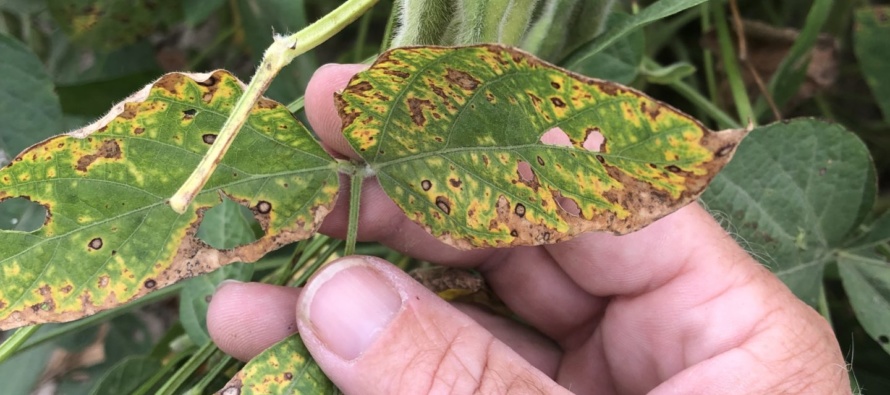2021 Soybean Stem Canker Inoculated Variety Trial Evaluations

Related Articles
- 2010 Soybean And Corn Variety Trial Data 3
- Rice Variety Trial Results For 2010, Plus Rice Research Report 0
- Evaluation of Peanut Varieties in Mississippi, 2010 0
Latest Tweets
All of the entries contained in the 2021 Mississippi State University Official Variety Trials (OVT) were evaluated for their reaction to the stem canker fungus. In addition, a few varieties (n=7; not including the checks used) were added to supplement the trials and obtain information on those particular varieties that were not entered by the seed respective companies in the MSU-OVT. Trials consisted of single rows of each cultivar planted in 10 foot plots and replicated 4 times. Within each row, a total of 10 plants were inoculated with a single toothpick that contained the fungus that causes stem canker (four isolates of the fungus were used for a fungal cocktail on toothpicks). Plants were inoculated approximately 8 weeks post-planting. Evaluations of stem canker severity were conducted between R6 and R6.5 by observing the stem of each inoculated plant for the presence of a canker. Observations of each variety were conducted using a modified 0-9 scale. Information contained within each table contain the analyzed stem canker rating as an average of all inoculated plants within the four replicate plots. In addition, each cultivar includes a stem canker designation: R=resistant, MR=moderately resistant, MS=moderately susceptible, S=susceptible. In field situations where stem canker has previously been observed, select soybean cultivars that have been observed to contain resistance to stem canker. However, with that said, stem canker can occur anywhere soybean has been planted with or without rotation. In fact, MSU Extension suggestions state that stem canker-resistant cultivars should be planted to reduce the likelihood of losses associated with stem canker. In addition, keep in mind that observations of stem canker tend to be more obvious when the environment is conducive for disease development. Therefore, over time, and in years when the environment may not be conducive for the development of stem canker, it is possible that stem canker designations change between years. Moreover, as additional fungal isolates are added to the collection it is possible that the rating as well as cultivar designation can change accordingly.
Xtend varieties:
Maturity Group IV Early (2021 MG IV early Xtend stem canker)
Maturity Group IV Late (2021 MG IV late Xtend stem canker)
Maturity Group V Early (2021 MG V Xtend stem canker)
Enlist varieties:
Maturity Group IV Enlist (2021 MG IV Enlist stem canker)
Maturity Group V Enlist (2021 MG V Enlist stem canker)
Conventional/LibertyLink/RoundUp Ready varieties:
Maturity Group IV Conventional/LibertyLink/RoundUp Ready (2021 MG IV Con stem canker)
Maturity Group V Conventional/LibertyLink/RoundUp Ready (2021 MG V Con stem canker)





Let me tell You a sad story ! There are no comments yet, but You can be first one to comment this article.
Write a comment